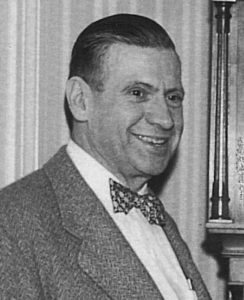The coronavirus pandemic sweeping the world is not something we will soon forget. Like the Great Depression and 9/11, it will forever change the lives of those living through it.
Pest management professionals (PMPs) are feeling the effects of the pandemic, as they cope with shelter-in-place orders and social distancing mandates.
Fortunately, pest control has been deemed an essential service by officials in several states, as well as by the U.S. Department of Homeland Security. As a result, PMPs with companies in states with shelter-in-place mandates may continue to work.
More than 75 years ago, PMPs encountered a similar situation.
In the 1940s, in the midst of World War II, the tireless efforts of one PMP helped ensure the pest control industry would prevail and its workers could continue to protect the health and safety of the public, according to Pest Management Professional‘s (PMP‘s) Hall of Fame website.
Were it not for the late Bill Buettner, pest control may not be the nearly $9 billion industry it is today.
That’s because the PMP Hall of Famer (Class of 1998) pushed for a national pest control association, working hard to establish the National Association of Exterminators and Fumigators (NAEF) — which changed its name to the National Pest Control Association (NPCA) and then the National Pest Management Association (NPMA). He served as its first president from 1933-1934, and its long-time executive secretary.
Buettner went to Washington, D.C., in the 1940s, to convince lawmakers that pest control was an essential industry to civilians, and should be exempt from certain wartime restrictions.
“That’s really what kept the pest control industry going through World War II, because the right people were allowed to remain in place and do their job,” said the late PMP Hall of Famer Dr. John Osmun (Class of 1997) and former head of the department of entomology at Purdue University, West Lafayette, Ind.
In addition, Buettner made sure that the supplies PMPs needed for pest control but were subject to wartime rationing, such as gasoline, were made available to them so they could continue to do their jobs.
“Bill was the dynamic first leader of the pest control industry,” Dr. Osmun said. “He’s the one who started the industry on the road to service and to greatness.”
Buettner, who was 55 when he died in 1953, was well loved by those in the industry who were shocked by his death due to complications from a gall bladder infection.
“He was unselfish, he was tireless, he had great perspective and he had a lot of personal empathy with people,” Dr. Osmun said.
Just as Buettner worked hard to ensure PMPs could continue to work, the NPMA is putting forth a similar effort.
On March 19, the U.S. Department of Homeland Security issued a “Memorandum on the identification of essential critical infrastructure workers during COVID-19 response” that states: “If you work in a critical infrastructure industry, as defined by the Department of Homeland Security … you have a special responsibility to maintain your normal work schedule.” On its list of critical infrastructure workers, the Department includes: “Workers such as plumbers, electricians, exterminators and other service providers who provide services that are necessary to maintaining the safety, sanitation and essential operation of residences.”
The NPMA regularly updates an essential services page on its website, and encourages PMPs to take action if their states have not made an essential services declaration.
Read more COVID-19 coverage here: MyPMP.net/COVID-19

Leave A Comment